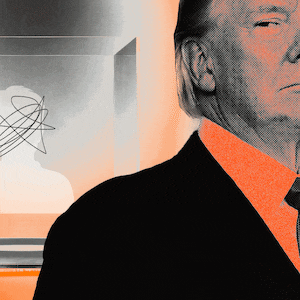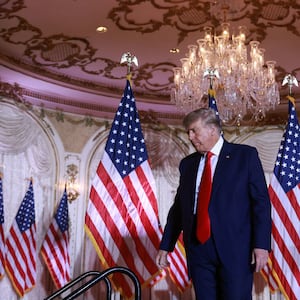In their desperate attempts to halt the New York attorney general from dealing a death blow to Donald Trump’s family business, the former president’s lawyers keep shopping the same failed arguments in states across the country. And judges are starting to call his legal team out for its bad-faith delay tactics.
Trump’s latest failure in New York state court shows just how far his lawyers are willing to go to appease the former president—and how much potential professional trouble they are willing to put themselves in.
On Friday, a New York state judge refused to dismiss the AG’s $250 million civil case against the Trump Organization for business and tax fraud, saying he was utterly unconvinced by the same lame arguments he’d already shot down.
Trump’s lawyers keep saying that Attorney General Letitia James, a Democrat who is New York’s top law enforcement officer, is merely engaged in a political “witch hunt”—and doesn’t even have the legal right to go after the company for its extensive history of simply making up fake real estate valuations.
Last February, when the matter was still under investigation, Justice Arthur F. Engoron tossed those arguments aside when ordering Trump to testify with investigators. In May, a state appellate court backed him up when it said “the investigation was lawfully initiated at its outset and well founded.”
When the investigation culminated in a financial fraud lawsuit against the company and Trump mounted the same defense, Engoron told them in court in November that he was tired of hearing it.
On Wednesday, he cautioned Trump’s lawyers to stop putting forth the same rejected arguments in an email that warned he was “considering imposing sanctions for frivolous litigation.” On Friday, he finally issued an order rejecting their request to dismiss the case and remarked that “sophisticated defense counsel should have known better.”
“Reading these arguments was, to quote the baseball sage Lawrence Peter (‘Yogi’) Berra, ‘Deja vu all over again,’” he wrote.
The fact that the Trump team comically acknowledged they are representing the former president by having the same arguments “re-presented” prompted Engoron to write that their action “strongly suggests frivolity.”
But he stopped just short of individually punishing the lawyers themselves, including Alina Habba of New Jersey, Christopher M. Kise of Florida, and Clifford S. Robert of Long Island.
Habba in particular has found herself in this judge’s sights, after repeatedly trading barbs with him in court in a manner rarely seen in the profession—frequently interrupting him on the bench, accusing him of unfairly siding against the former president, and making snide remarks about his law clerk.
It’s gotten so heated at times that her own colleagues on Trump’s legal team have quietly criticized her for putting on a show better fitted for nighttime cable news programs than the courtroom. (She has since become one of Trump’s attack dogs on right-wing TV channels like Newsmax and One America News Network.)
Habba did not respond to a request for comment about Engoron’s decision to spare her this time around.
But legal ethics scholars noted that it’s strange for legal proceedings to get this hot—or this ugly.
“It is quite rare. The lawyers have to worry not only about monetary sanctions, which may not be as much of a worry, but also court discipline that can lead to a public censure, license suspension or disbarment,” New York University law school professor Stephen Gillers said.
The first time these Trump legal arguments failed, Trump was trying to dodge a subpoena to testify under oath about the way he’d routinely falsify financial records to inflate the value of his properties—either to snag better bank loans or maximize tax write-offs on donated land. Then, as now, the move was seen as a blatant delay tactic.
“I think the fact that Trump's lawyers are repeating the same claim is a signal to the court that they are acting in bad faith, bringing the claim simply to delay the litigation or to make a political point. Courts do sanction lawyers when they believe the lawyers are abusing the courts in this way,” said Rebecca Roiphe, a New York Law School professor who specializes in professional ethics.
Trump’s lawyers are so desperate to block James’ investigation that they’ve even asked judges outside New York City to intervene, so far to no avail.
In December 2021, Trump resorted to suing James in federal court in upstate New York, hoping that a U.S. district judge would exercise her broad authority to hit the brakes on a state-level investigation. That misadventure went nowhere, and the case was dismissed. U.S. District Judge Brenda K. Sannes ruled that it wasn’t unfair for James, who promised to target Trump as AG while she was running for that political office, to follow through with an investigation after hearing about claims of fraud from an insider.
Trump “failed to produce any evidence that the state proceeding has been conducted in bad faith,” she wrote.
Trump sued James yet again in November, this time in a local state court from his oceanside estate of Mar-a-Lago in faraway Palm Beach County, Florida. The new spin on this lawsuit was that James is unfairly trying to gain information about his revocable trust, which contains his private estate plans for disbursing his riches upon death.
The lawsuit claims that James “abused her position as Attorney General for the State of New York to pursue a relentless, pernicious, public, and unapologetic crusade against President Trump, a resident of Palm Beach County, Florida, with the stated goal of destroying him personally, financially, and politically.”
That didn’t work out either. The lawsuit was transferred to federal court, where the former president struck out when it landed before a judge who’d already become familiar with Trump’s notorious delay tactics and garbage litigation strategy. It didn’t help him that it came just as the Trump Organization was found guilty of tax fraud in a parallel investigation run by the Manhattan District Attorney and James’ office—justifying her own civil investigation of the company.
“The Trump Organization has already been found guilty by a New York jury of several counts of tax fraud. To now impede a civil enforcement action by the New York Attorney General would be unprecedented and contrary to the interests of the people of New York,” wrote U.S. District Judge Donald M. Middlebrooks, later adding in a footnote that “this litigation has all the telltale signs of being both vexatious and frivolous.”
Trump’s lawyers now find themselves in the position where they’ll have to finally come up with explanations over why the real estate mogul faked the value of his 11,000 square foot New York City flat at Trump Tower by tripling its size on paper. And among other inexplicable financial games, they’ll also have to defend the way Trump ballooned the value of his forested estate north of the city before he donated it for conservation, pricing it as if it had been a lucrative development project as opposed to the failed land deal it was.
At the moment, Trump and the AG’s investigators are supposed to be answering each other’s legal questions in the run-up to a trial scheduled to start this October. For her part, the attorney general celebrated how Trump’s delay tactics have reached the end of the line.
"Once again, Donald Trump’s attempts to evade the law have been rejected,” she said in a statement on Friday. “We sued Mr. Trump because we found that he engaged in years of extensive financial fraud to enrich himself and cheat the system."








